|
Non-Aligned:
Depiction of multifaceted socio-cultural landscape
By Ranga Chandrarathne
The group exhibition of painting entitled Non-Aligned currently being
held at Barefoot Gallery can be summed up as an attempts by a group of
artists from diverse backgrounds and with varying experiences in the
field.
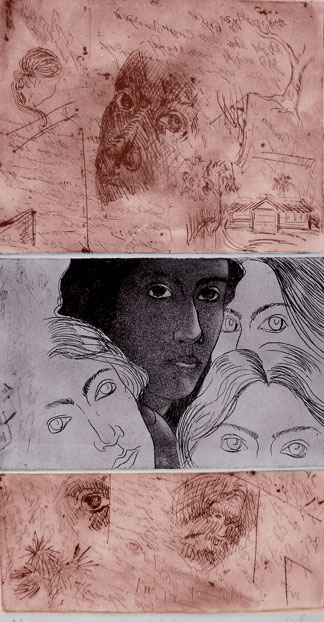 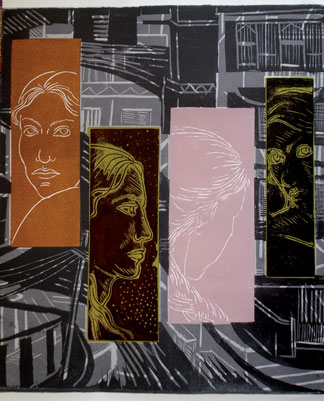 The exhibition features the works of artists Vaidehi Raja,
Thamotharampillai Shanaathanan, Muhanned Cader, Mariah Lookman, Lala
Rukh and Ieuan Weinman. The works exhibit reflect on the complex issues
such as identity, relationships, memories, hopes and dreams. At times
they also explore personal, collective, political and environmental
issues often expressed through tones. The exhibition features the works of artists Vaidehi Raja,
Thamotharampillai Shanaathanan, Muhanned Cader, Mariah Lookman, Lala
Rukh and Ieuan Weinman. The works exhibit reflect on the complex issues
such as identity, relationships, memories, hopes and dreams. At times
they also explore personal, collective, political and environmental
issues often expressed through tones.
Among Vaidehi’s exhibits, the painting entitled ‘Etching and Dry
Point’ is rather thought provoking. The painting is primarily made up of
three segments, first segment with a red texture, second with a black
and white texture and the third with a red texture. Faces have been
traced on them.
Apart from the faces, there are other objects such as houses and
trees which may represent the thought trends of the men and women in the
contemporary society.
In his other paintings or rather wood-cut prints, he has further
depicted the same idea. Different facial expressions of a woman have
been the subject of the paintings against the backdrop of labyrinth of
houses, buildings and next works roads.
It is clear from the background, what Vaidehi represents is the urban
woman. The artist skilfully captures the complex urban socio-economic
landscape and the multiple roles the urban woman has to play in it.
Shanaathanan’s tree exhibits belong to abstract paintings. The first
of the untitled paintings shows a human figure pouring water by means of
a horse-pipe on to his head against the backdrop of jumbled landscape.
One can come to the conclusion that the background of gray with some
blurred tracings represents the mindscape of the urban man.
The artist depicts the complex life style with strenuous loads of
work one has to put up with by a grid of lines which represents an area
map of an urban landscape. Shanaathanan further expands his vision in
the following two paintings.
Muhanned Cader’s paintings deal with the perception of rubbish. The
rather surreal objects represent different perceptions of rubbish rather
than mere physical forms. For instance one of his paintings is similar
in shape to a bone which may be a bone of contention.
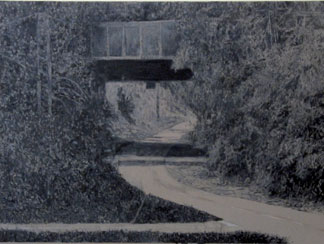 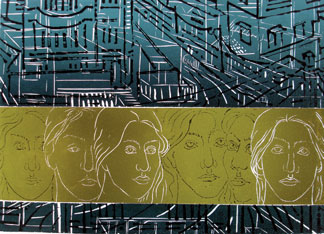 Mariah Lookman’s paintings are also abstract paintings with a rather
complex grammar and syntax. At a superficial level, they are like some
tiny objects floating in the air. The background for the paintings is
ash. Mariah Lookman’s paintings are also abstract paintings with a rather
complex grammar and syntax. At a superficial level, they are like some
tiny objects floating in the air. The background for the paintings is
ash.
However, at deeper level, the paintings can be read in a different
light. The black molecular particles which hover in the air can be
interpreted as different currents of emotions in the modern man. The
paintings are so complex that can be subject to diverse readings.
Lala Rukh’s paintings are made up of tiny white particles moving in a
black environment. Although the encoded message is hard to decipher, he
represents the identity crisis in complex modern milieu.
The identity of a person in a modern society is complex and multiple.
One may represent at different levels, a village, region, township,
ethnicity, caste and even nationality. This multiplicity of identity can
happen simultaneously.
Ieuan Weinman’s painting entitled ‘Smoke and Fragments’ offer a
complex vision. It may represent the environment pollution. Rather
abstract sense, the vision may be that the environment pollution,
ultimately, reduces everything into smoke. It is obvious that the
polluter is the man.
His other painting entitled Threatening Environment clearly indicates
the human intervention in the environment which threatens the existence
of complex eco-systems by disturbing the ecological balance. The picture
depicts an overhead bridge and road ran through a dense jungle. The road
and the bridge represent the man’s inroad into the environment.
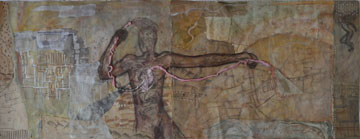 Non-aligned offers non-partisan views, perceptions and ideas of a
group of artists who have tried to represent complex socio-economic
reality of our times. Non-aligned offers non-partisan views, perceptions and ideas of a
group of artists who have tried to represent complex socio-economic
reality of our times.
They, in essence, are abstracts representing the vast canvas of human
existence particularly in the context of rapid urbanisation and
individualisation of man with a mass of moving population in the highly
congested metropolises. One of the prominent themes is the identity
crisis in modern times.
At one point, individual identity is fractured and taken over by the
mass identity of the urban milieu and at an another, it is the
individual identity which emerges an a distinct entity in the labyrinth
of city architecture which synchronises with complexities of individual
mindscape.
|

